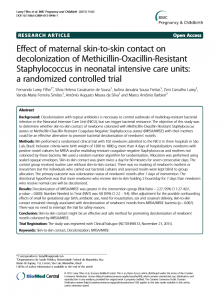
Staphylococcus resistant to methicillin-oxacillin is one of the most frequent pathogens colonizing newborns (NB) admitted to Neonatal Intensive Care Units. They are identified as being primarily responsible for outbreaks of nosocomial infection especially in situations of overcrowding and understaffing. Mupirocin promotes decolonization of these bacteria, but does not prevent outbreaks of infection and can trigger bacterial resistance. Studies suggest that the presence of nonpathogenic bacteria can inhibit MRSA growth. Uehara et al. showed that colonization by MRSA could be inhibited by the presence of methicillin non-resistant bacteria (Streptococcus viridans group) in the oral cavity of newborns admitted to neonatal units. Shimizu et al. also showed the same effect on preterm infants admitted to the NICU of Nagano Children’s Hospital. Other studies have indicated the possibility of transmission of MRSA from mother to newborn through skin-to-skin contact. In 2003, Kawada et al. postulated that transmission of MRSA from mother to infant could occur through breastfeeding. Sakaki et al. found an association between skin-to-skin contact and newborn MRSA infection. Several studies have also shown that certain bacteria of the normal flora of human skin and mucous membranes have the ability to take the place of multiresistant bacteria that are already installed, through a competitive mechanism termed bacterial interference. This mechanism has been used to promote healing of infections by multiresistant bacteria mainly in the fields of urology and otorhinolaryngology.